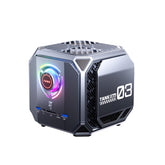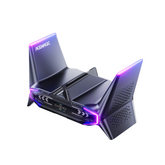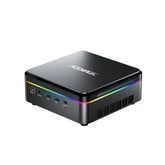Mini PC vs Laptop: Which One Is the Future of Computing

Introduction
Computing has evolved from bulky desktops to thin laptops, and now extremely thin mini PCs. Each new evolution is predicated on changing user demands for performance, miniaturization, and mobility. With the growing interest in high-performance yet small alternatives, the trade-off between a mini PC and laptop assumes special relevance for users deciding their computing option.
This article compares the basic differences and the future potential of each to allow readers to make an informed decision about what best suits their needs.
Knowing Mini PCs: Desktop Power in a Small Package
A mini PC is a tiny computer that takes the central components of a desktop—such as a processor, memory, storage, and I/O ports—and puts them into a much more compact form. The machines range from stick PCs and fanless PCs to tiny towers. Despite their small size, most handle regular computing activities such as web browsing, word processing, and media playback without problems.
Unlike laptops, which are self-contained systems with their own displays and batteries, mini PCs must be connected to peripherals outside themselves. They require a monitor, mouse, and keyboard to operate, so they are more suited to static installations such as home offices or media centers.
Performance and Cooling: Mini PCs Show Their Strength
Mini PCs and laptops have the same CPUs and memory, but the cooling design that separates their actual performance. Mini PCs have room to spare for fans and airways, which make them perform consistently well under heavy loads.
Laptops must contend with heat in confined internal volumes. This can lead to thermal throttling for a prolonged period of use, especially for small ultrabooks. Gaming laptops do contain performance-oriented components but are compact and hot when under load.
On the other hand, gaming mini PCs are capable of supporting desktop-class GPUs and CPUs. These systems provide games and creative work more evenly and can be quieter because they have better airflow. Fanless mini PCs, although lower in brute power, are best suited for silent environments.

Portability and Daily Use: Setting the Trade-Offs
Laptops were invented to be mobile. Their battery-powered, self-contained design allows one to work anywhere—whether it be a cafe, campus, or client location. Their mobility is ideal for students, contract workers, and travel warriors.
Mini PCs require an external display and uninterrupted power source. They are best used in stationary installations that favor a clean desktop environment. With the right peripherals, users can create tailored environments for focused task work.
| User Type | Preferred Device |
|---|---|
| Students | Laptop |
| Digital nomads | Laptop |
| Office professionals | Mini PC |
| Gamers | Gaming mini PC |
| Remote workers | Mini PC or Laptop |
Laptops are generally better suited for users who want portability more than raw processing power. For those who are building efficient workstations or dedicated entertainment systems, mini PCs provide good value for compact packages.
Upgrade Potential and Long-Term Value
Mini PCs are more upgradable. The majority can replace or expand RAM, storage, and even the GPU. This provides for longer useful life in a device and incremental upgrading as needs change.
Laptops, especially ultrabooks, are increasingly being designed with soldered components. While some allow for SSD or RAM upgrades, most don't. This limits customizability and may shorten lifespan if performance demands grow.
Repairability is also in the favor of mini PCs. Common parts and simpler construction make them serviceable and cost-effective. Thin laptops, however, typically require professional servicing for even simple repairs.
For long-term value, users who prefer upgrades over replacements will welcome that mini PCs offer a lower total cost of ownership.
Why Mini PCs Align with Today's Workspace Trends
The rise in remote work and the need for space-saving setups has driven demand for mini PCs. Compact and energy-saving, they are suitable for home offices, living rooms, and collaboration spaces.
Their quiet operation, power saving, and full-performance features make them ideal for people who do not need to carry their computers daily. Mini PCs are also employed by businesses for digital signage, reception desks, and conference rooms where reliability and understated design are a priority.
Laptops are still a vital component of mobile computing. But for fixed installations where longevity and neatness are considerations, mini PCs present a futuristic option.

Learn About ACEMAGIC's Mini PC Line
ACEMAGIC provides a broad range of mini PCs for different use scenarios—from general productivity to home setups and office applications. These small computers ensure reliable computing in portable designs ideal for desks with minimal space or neat cable management concerns.
For editing documents, web browsing, video viewing, and remote collaboration with light to moderate workloads, the ACEMAGIC S3A Mini PC is the perfect pick. Silent operation and low power consumption give it a suitable option for students, remote workers, or anyone looking to streamline their desktop experience.

ACEMAGIC S3A Mini PC
With a vertical space-saving design and tool-free magnetic access, the S3A makes upgrades effortless. Ryzen CPUs power it up to the AI-ready 8945HS and handle everything from daily tasks to creative work. DDR5 and PCIe 4.0 deliver ultra-fast performance, while dual-fan cooling keeps it quiet and stable.
While not all mini PC models are designed for heavy-duty usage, ACEMAGIC also offers setups for more heavy-duty uses. Power users or gamers can resort to the TANK 03 series, which supports dedicated graphics cards and advanced cooling setups for smoother performance in heavy-duty scenarios.

ACEMAGIC S3A Mini PC
The ACEMAGIC TANK03 12900H Pro is a powerhouse mini PC featuring the Intel® Core™ i9-12900H processor and NVIDIA GeForce RTX 4060 GPU, delivering exceptional performance for gaming, AI, and professional tasks.
Whether you are building a small desk or require a concealed computing system, there is an ACEMAGIC mini PC to meet your purpose.
Explore ACEMAGIC's Laptop Solutions
ACEMAGIC also offers laptops that are suitable for individuals who prefer flexibility and mobility without sacrificing strong performance. Such laptops meet the requirements of hybrid staff, students, and business professionals who need to travel between locations frequently.
For dependable performance and a slim profile, the ACEMAGIC RX16 delivers strong computing power for daily work, presentations, and multitasking. For experts who value multi-screen workflows or extended visuals, computers like the ACEMAGIC X1 with dual-screen functionality offer additional flexibility.
From business meetings to working on the move, or even working between locations, ACEMAGIC laptops offer mobile power and dependable performance.

ACEMAGIC RX16 AMD Ryzen™ 7 7735HS
The ACEMAGIC RX16 features an AMD Ryzen™ 7 7735HS processor with 8 cores and 16 threads, delivering responsive multitasking and smooth performance for everyday work and entertainment. Its 16-inch IPS display with a 16:10 aspect ratio and 1920×1200 resolution ensures vivid visuals and comfortable viewing. Equipped with 16GB DDR5 RAM (expandable up to 64GB) and a 512GB PCIe 3.0 NVMe SSD (up to 4TB supported), it offers fast performance and generous storage capacity.
Conclusion: Which Device Fits Your 2025 Needs?
A choice between a laptop vs mini PC will be determined by your requirements. Travelers and consumers requiring utility versatility without external devices will love laptops. Consumers using constant workstations, gaming stations, or design spaces will find more use in mini PCs.
Evaluate how you use your system every day. For performance-driven, quiet operating, and upgradable users, a mini PC can meet those needs better than a laptop.
Learn more about ACEMAGIC's product line for compact solutions that work with today's and tomorrow's demands of computing.
FAQs
How long does a mini PC last?
A properly designed mini PC will last 5–8 years or more, especially if it uses common, replaceable components. Good airflow and upgradability lead to a longer useful life.
Is a mini PC a good fit for students?
It depends on mobility needs. Students who spend most of their time working at their desk will enjoy the performance and less clutter of a mini PC. Students who have classes or study in various rooms will get more use out of a laptop.
Can I use a mini PC to play games?
Yes. Gaming mini PCs have modern GPUs and CPUs and can play AAA titles with no problem. Just make sure the model is a gaming-oriented build that is well-cooled.
Is a mini PC or a laptop better for remote work?
Both are good depending on setup. If you do work from a dedicated home office, a mini PC with large monitors and full-size peripherals might be more comfortable and productive.
Do mini PCs overheat easily?
No. Most mini PCs have well-designed cooling solutions, and many are cooler-running than laptops. Fanless models are intended for quiet rooms and light to moderate use.
Do mini PCs have HDMI ports and other common interfaces?
Yes. The majority of mini PCs sport HDMI and DisplayPort connectors to link with a single or multiple monitors. They also typically come with USB-A, USB-C, Ethernet, and audio ports. More powerful models may include dual HDMI or additional USB connectors, useful for docking station or multi-monitor applications.
Are mini PCs compatible with standard monitors and peripherals?
Yes. Mini PCs are compatible with standard peripherals such as HDMI or DisplayPort monitors, USB keyboards and mice, Bluetooth accessories, and external storage drives. Provided your accessories use standard connections, compatibility is not a problem in most cases.







Leave a comment
Please note, comments need to be approved before they are published.